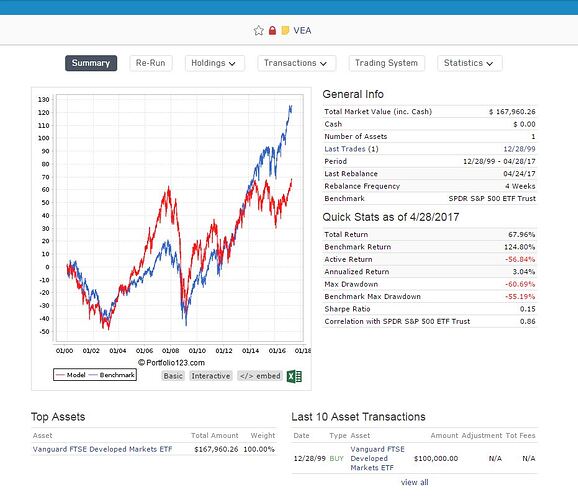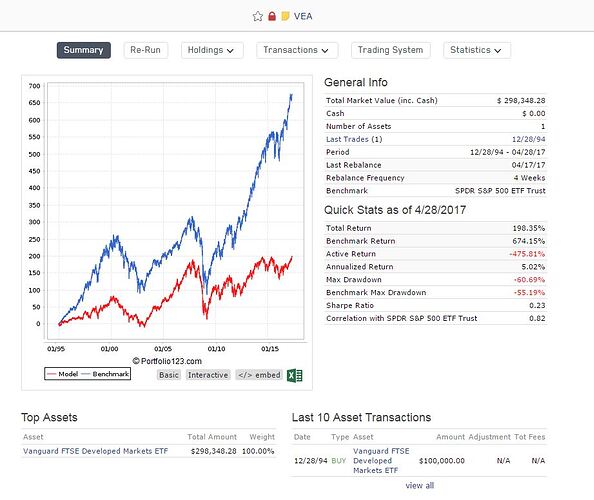I am not an expert on international investing (I bought Vanguard’s VEA developed country index fund a couple of years ago thinking Europe and Japan were cheap and then proceeded to lose 15%. But I think I was just too early because VEA has beaten SPY year to date. So maybe its time to relook). What public sources (websites, etc) do you use for evaluating countries or regions? I am using VEA as a proxy for investing internationally.
I found this:
http://www.starcapital.de/research/stockmarketvaluation
Any others?
Thanks.
Looking at VEA further (again, it is all Developed markets inc Japan, of course and tracks the MSCI EAFE index), from 2000 to 2013, it actually looks stronger than SPY. It just has stumbled for the last couple of years. So maybe it is a decent USA hedge.
But then looking at it starting 5 years earlier, starting in 1994, the story changes considerably for the worse. Anyone have any idea why the big difference in performance with just a 5 year change? Is this really a decent hedge? I am concerned that it really will correlate to SPY (see the ~0.8 correlation).
I put SPY and VEA in a book and tested from 1994, 2000 and 2012 with different asset weighting ratios. All gave me negative Alpha compared to SPY. So not really sure what the added value is of adding VEA to my asset mix is. What am I doing wrong or could do better?
Further, I did the same thing with Vanguard’s Emerging Markets fund, VWO. The story changed. Testing from 1998, I got a consistent positive Alpha (albeit small) when combined with SPY from 1998. The last three years had negative Alpha, but positive since 1998. Maybe Emerging markets is the trick, not Developed markets. Comments?
Given that you’re on a website that uses backtested data, did you consider using some of your metrics with Country(“USA”)=0 to eliminate domestic stocks?
If you’re looking for a dividend play, try TSM, LYB, and NVO.
For a growth play, try KORS, or CSTE.
Good luck.
Thomas
Valuation and currency changes could explain a part of the difference in performance.
In the 1995-2000 period international stocks underperformed brutally because of the heavy weight of Japanese stocks in world market cap, at a time were relative valuation for Japan was terrible.
2000-2007 saw profit booming (and a stronger currency) in the Eurozone thanks to the Euro integration, something not present in US.
From 2014 on profits stalled in Europe causing cyclically adjusted valuation to drop, while lower Yen (QQE) stemmed dollar returns for japan equity. Others commodity related DC suffered from lower producer prices.
In addition, a stronger dollar played a big role in lowering further international exposure returns in dollars.
What public sources (websites, etc) do you use for evaluating countries or regions?
I’m also struggling with this.
Star capital is a good source, in my opinion but remember the time periods for CAPE ratios are a decade to 15 years. So if you are not patient or you think you’ll need the money sooner, perhaps it’s not a good idea to invest based on the CAPE ratios.
There are MSCI indexes you can look at. Just google “MSCI Japan Index” for example:
https://www.msci.com/documents/10199/b3ee6464-f705-4d65-81a0-d8756607cf9f
These will give additional info - as well as the components. (For instance, Korea has a very large Samsung component - about ~%30. So it would not make sense to buy the Korean MSCI Index if you are not bullish about Samsung.)
Is this really a decent hedge? I am concerned that it really will correlate to SPY
I think at this point, anything is a decent hedge against SPY. 
[quote]
Anyone have any idea why the big difference in performance with just a 5 year change?
[/quote]You nailed it.
People spend far too much time analyzing the performance between two points in time. They forget that two points of data means nothing. That’s why I look at rolling returns instead.
I look for consistent outperformance over rolling three-year periods.
[quote]
What public sources (websites, etc) do you use for evaluating countries or regions?
[/quote]I have been using GuruFocus.
It’s not perfect, but it stays updated automatically.
Thank you everyone for the feedback. I really appreciate it. I will check out you references, ideas and data. All good.
On the rolling tests, I appreciate your comment. I completely agree about the use of rolling tests and looking for consistency. After seeing comments from yourself, Jim, Marc and others about seeing performance as more a distribution of results than just one number (or testing over many time spans instead of just one) has opened my eyes to the need of trying ports for a longer period of time (3 years is a good number) as well as knowing ahead of time that there is some possibility in that 3 year period that I may still trail my benchmark. So it has made my expectations more realistic. It is a distribution of different possible outcomes. The rolling test tool and reporting capability is great to have.
Anyway, that was my impetus for looking at VEA in the different timeframes. I could see the gross difference in results and lack of consistency. The comments above about the economic environmental conditions role in creating the inconsistency is great. more to learn…
I also forgot to mention. You can always do good old fashioned Google searches. (I’m not sure whether this kind of research will appeal to members of portfolio123 but I’ve always been of the opinion that best investment ideas combine quantitatively undervalued assets with qualitatively good future prospects.)
Here are some I found on Valuewalk, specific to Korea:
Bullish:
http://www.valuewalk.com/2016/10/3-reasons-invest-south-korea/
(There was also an interview with the manager of the actively managed KOR etf but I can’t find it now for some reason.)
Bearish:
http://www.valuewalk.com/2017/01/korean-stock-market-samsung/
http://www.valuewalk.com/2017/04/dont-rush-korea-just-super-cheap/
There was also this recent WisdomTree article on emerging markets in general. I don’t know if I buy their arguments based on historical correlations based on PPP but I do think the following:
(1) most everything in investing is cyclical (though the cycles could last for a decade or more)
(2) US equity market has swung too far out wide whereas other markets have lagged. It would be prudent to expect a mean reversion, though no one can time these things exactly.
Here:
https://seekingalpha.com/article/4067530-timing-ripe-emerging-market-equities
There is also a thesis that says you should only invest in dividend paying countries outside the US. Since you don’t know much about the country or the company’s accounting, paying dividends is a quality/legitimacy check. If you find yourself in agreement with this, you can check out the reasonably new Vanguard VYMI ETF:
https://personal.vanguard.com/us/funds/snapshot?FundIntExt=INT&FundId=4430
Anlam,
Korea ist a high risk gamble. Everything will depend on what is happening between the North- and South Korea / US.
If there is no war breaking out, your strategy will pay off nicely.
If there is a war, then Korea will be finished as an industrial cuntry for years to come.
Too much of a gamble for my taste.

